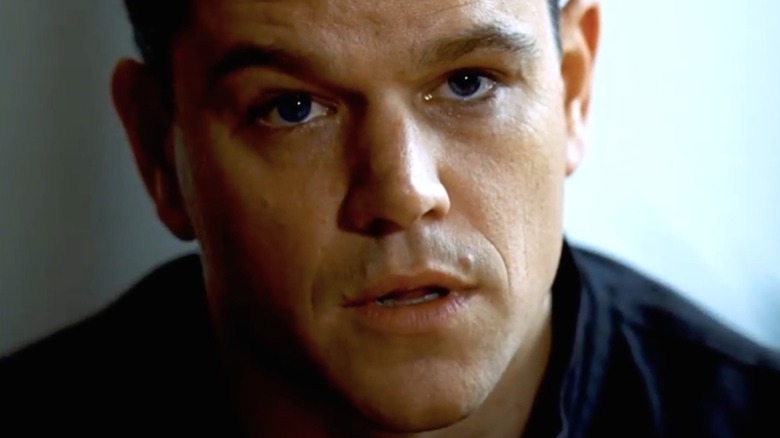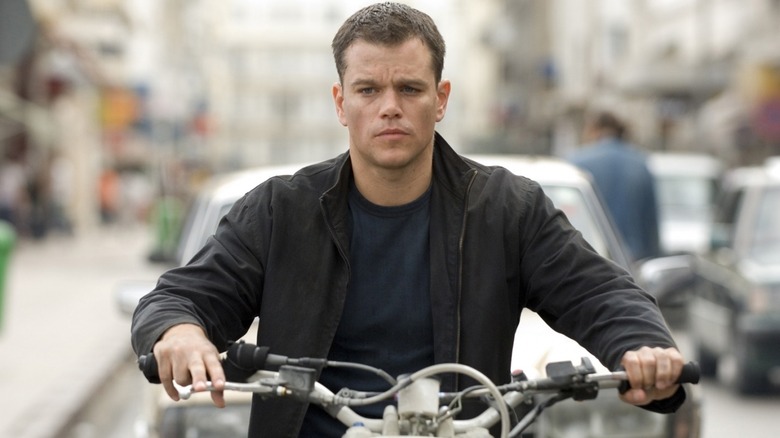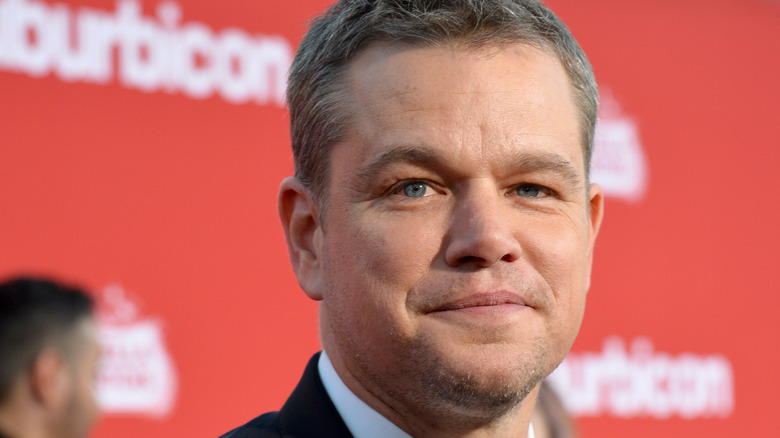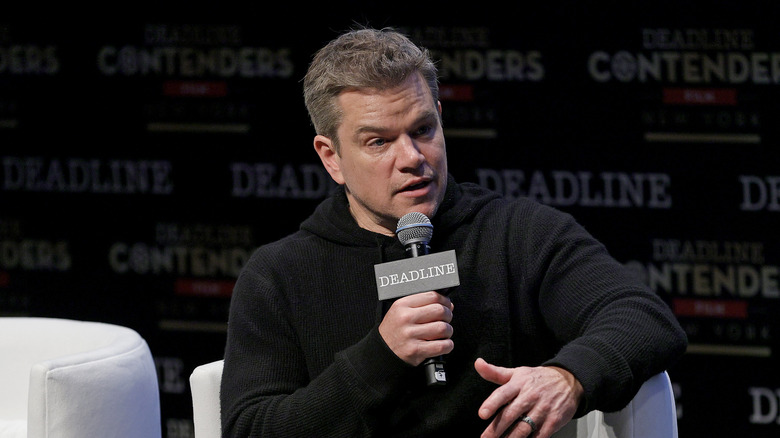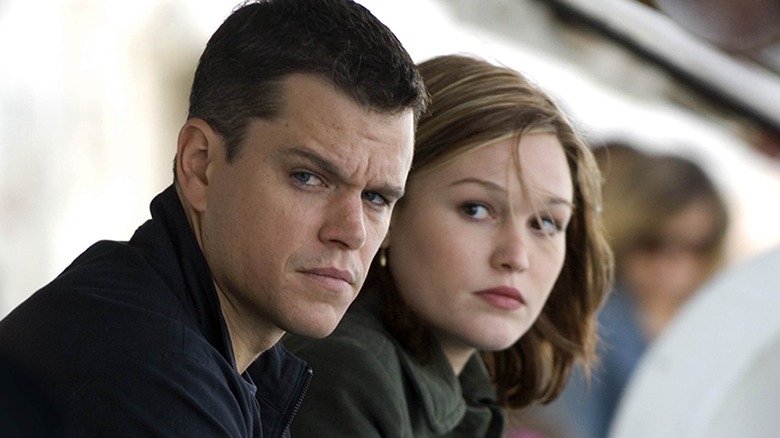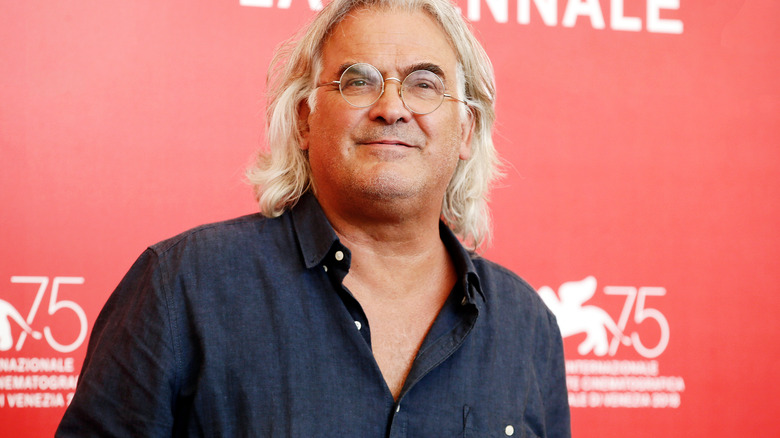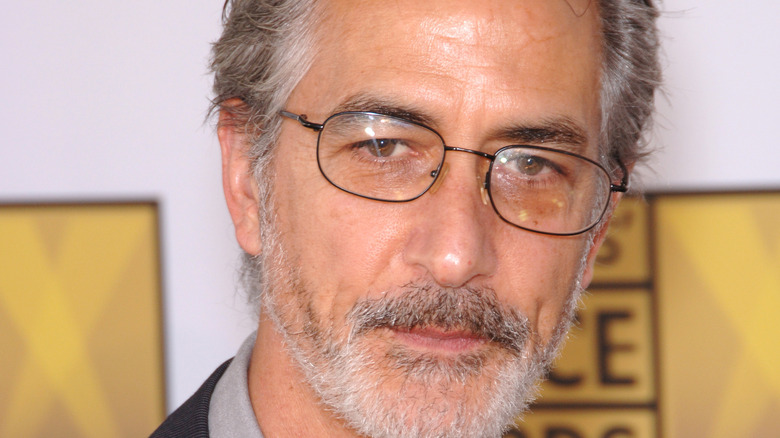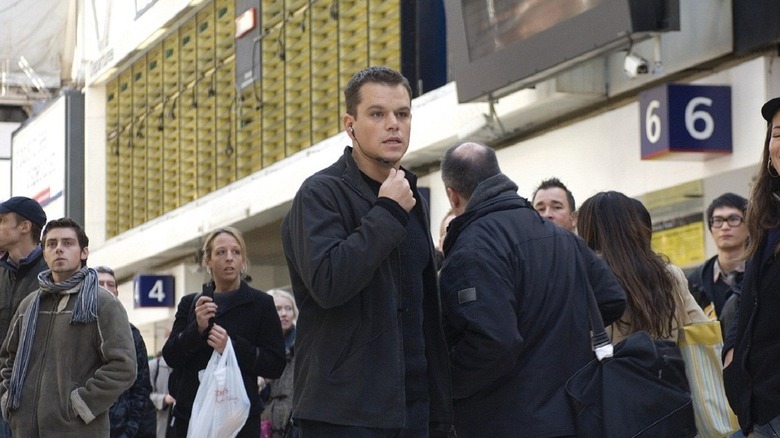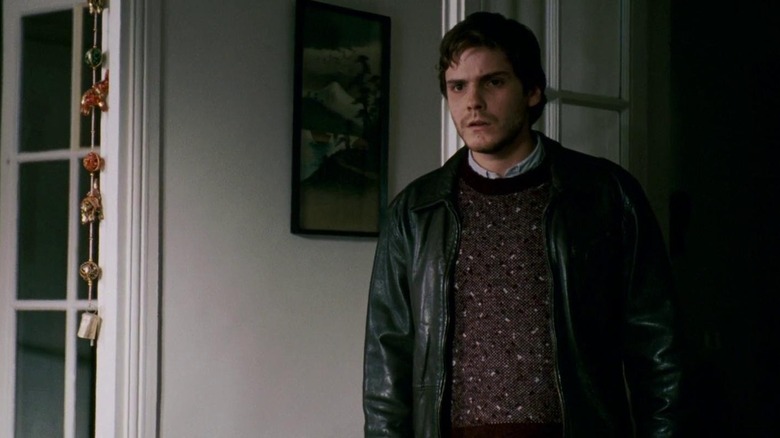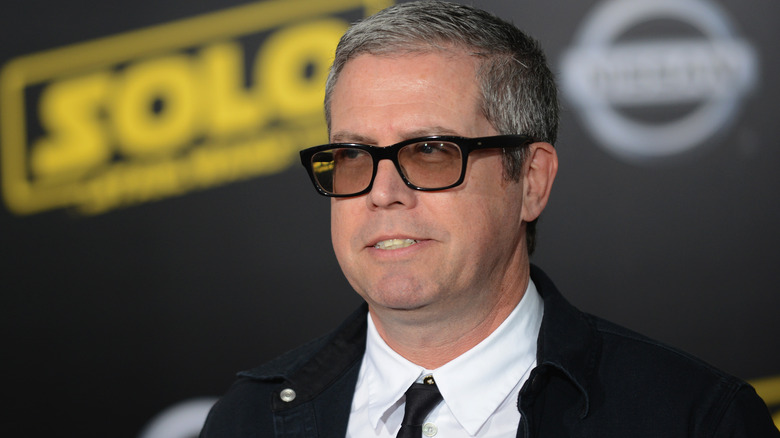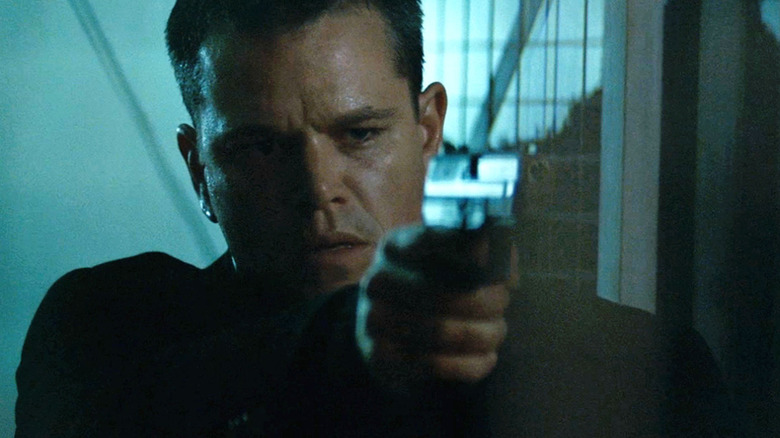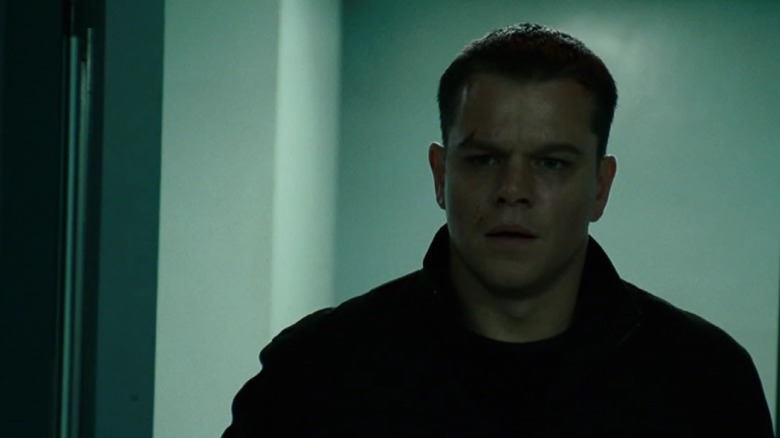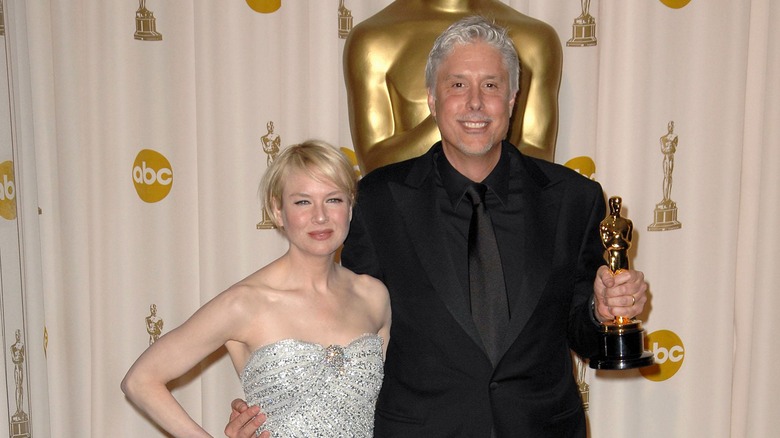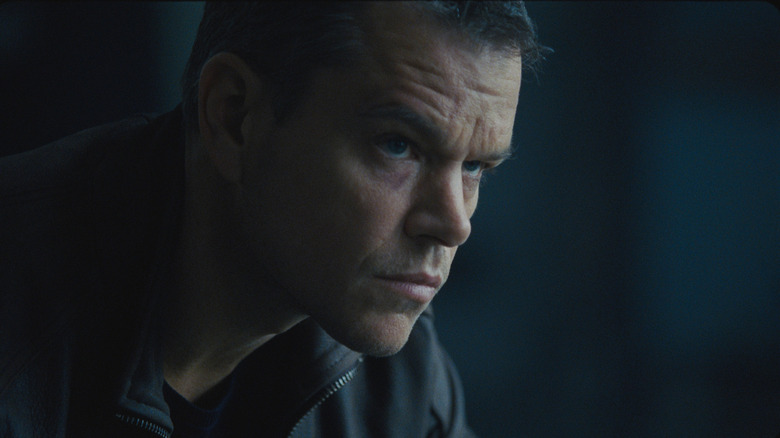The Untold Truth Of The Bourne Ultimatum
Even a man on the run like Jason Bourne can't be off the grid forever. Everybody has to come home, and so "The Bourne Ultimatum" brings Bourne back to New York City to get answers about his past. By the movie's end, Bourne manages to finally get clarity over his past, even if he doesn't quite get the answers he was looking or hoping for. All the while, Bourne's been taking out bad guys and blowing up big objects as only he can. The result of all this mayhem and backstory is a film that caps off the original "Bourne" trilogy properly. Finally delving into the character's past without undercutting the intrigue that defines this franchise, it finds Matt Damon as capable as ever in the action sequences.
The positive reception "The Bourne Ultimatum" received among the general public has made it a well-known movie, but just like Jason Bourne himself, it's got plenty of secrets to dig into. Elements like Damon's initial response to the first draft of "The Bourne Ultimatum" or the award-season victories of this installment, among many other details, make up the captivating untold truth of this summer blockbuster.
The Bourne Ultimatum's balance of thrills and themes
The interpretation of the original "Bourne" trilogy as a commentary on American policy in the wake of 9/11 is no secret. Lengthy academic essays have been written on this topic, and tend to focus on how the "Bourne" movies made members of the U.S. government the villains in an era where distrust of elected officials was soaring (via JSTOR). This interpretation also leans on how surveillance, a hot topic in the wake of the September 11 attacks, was often depicted as antagonistic in these features. In essence, viewers could live out fantasies of fighting back against corrupt American forces by watching Jason Bourne take out his enemies.
As with countless other movies, though, an interpretation gaining popularity does not automatically mean it's something that was intended by the filmmakers. In talking to Collider, "Bourne Ultimatum" director Paul Greengrass noted that the objective with this sequel first and foremost was to make something fun. In his mind, people looking for escapism on a Saturday night didn't want to watch a movie that involved characters who evoked Dick Cheney. However, Greengrass did note that he wanted to root the world of Jason Bourne in tangible reality, which did mean a sparse amount of sociopolitical commentary that he compared to a "little bit of chili." Even if it wasn't intended to define the entire movie, though, installments like "Bourne Ultimatum" have become associated with cinema that comments on a post-9/11 world.
Matt Damon had harsh words for Ultimatum's first screenplay
A few years after "The Bourne Ultimatum" was released, Matt Damon came out swinging with some complaints about one of the movie's screenwriters. Talking to GQ, Damon had sharp words for screenwriter Tony Gilroy, and specifically the quality of work he turned in on the script for "Ultimatum." Damon attributed the shoddiness of the writing to how Gilroy was contracted to only write one draft of the screenplay for Universal Pictures. Damon himself admitted that it was a sweet deal for Gilroy, who got a hefty sum for minimal work, but the actor was furious over the quality of the script. Damon did note, though, that these feelings all stemmed from how much Damon respected Gilroy as a screenwriter, and that he felt hurt to see him not living up to his potential.
Damon did not divulge what specific aspects of the original draft of the "Bourne Ultimatum" screenplay didn't sit well with him, but he did admit to GQ that it was "unprofessional" for him to lambast Gilroy's work in such a public manner. Per The Hollywood Reporter, Universal itself released a statement shortly after these comments were made. This statement noted that the studio "could not imagine replacing Matt as Jason Bourne," an indication that Damon's words wouldn't impact his future in the "Bourne" series, but that the studio also stood by Gilroy and his work.
How Matt Damon felt playing Jason Bourne for so long at the end of this trilogy
The "Bourne" trilogy wasn't just a big break for Matt Damon as an actor — it was also the first time in his career that he was playing the same character in multiple different movies. Having established his name with standalone dramas like "Good Will Hunting," kicking off a serialized adventure series with "The Bourne Identity" was new territory that radically changed the trajectory of his career. With the third entry in the initial "Bourne" trilogy providing some form of closure for the Jason Bourne character, Damon was feeling the unique weight and excitement of playing one role for so long.
Speaking to Collider, Damon reflected that, as "Ultimatum" was coming out, he had spent seven years of his life wrapped up in the character. Not only did he enjoy getting to play Jason Bourne over that time, but he also appreciated how a guaranteed hit like "The Bourne Ultimatum" gave him the freedom to pursue daring projects like "Syriana" in between "Bourne" installments. He also noted that the franchise had made him more in demand than he'd ever been in his entire career.
The joy Damon felt about audiences cheering for Bourne Ultimatum
There's such a serious tone to "Bourne" adventures like "The Bourne Ultimatum" — not to mention weighty topics being explored like the CIA's misuse of power or the horrifying consequences of rampant surveillance — that it can be easy to forget that these are summer blockbusters. Even if they're directed by the guy responsible for films like "Captain Phillips" and "United 93," features like "The Bourne Ultimatum" are still meant to be films you can watch with a big box of popcorn and a sugary drink. None other than Matt Damon got a surprising reminder of just how entertaining these movies can be when he learned how "The Bourne Ultimatum" went over with a gigantic crowd.
Collider asked Damon how he felt about Jason Bourne inspiring cheers by violently dispatching an enemy. "It feels so good I can't even tell you," he answered. Damon then recounted how he was getting second-hand accounts of audiences going wild for the movie during its very first press screening. Hearing that audiences were having such vivid and vocal responses to the hard work Damon and everyone else in the cast and crew put into "The Bourne Ultimatum" just made this performer unspeakably pleased. Pulling off a movie this big is a complex task, but the roaring cheer of a crowd makes it all worth it.
The level of ownership Paul Greengrass feels over The Bourne Ultimatum
The age of the Marvel Cinematic Universe and other intertwined franchises have given new prominence to questions over how much auteur authority filmmakers have over these big-budget blockbusters (per Film School Rejects). But inquiries over whether or not directors had much sway over these sorts of movies existed long before the days of Kevin Feige reigning supreme, or of Phil Lord and Chris Miller getting ousted from "Solo: A Star Wars Story." Talking to Collider in 2007, Paul Greengrass responded to a question over how much ownership he had over "The Bourne Ultimatum" by noting that movies of this magnitude were always "a group activity."
However, this doesn't mean Greengrass felt like he had no input on the film. On the contrary, he felt something like "Bourne Ultimatum" being the result of so many hands was only natural given the enormousness of these projects. He then talked enthusiastically about the large team he collaborated with, working together towards "the same vision for Bourne." Of course, the result of all that collaboration isn't a classic auteur effort, but it does show that distinctive filmmakers like Greengrass can work within the confines of a mainstream blockbuster.
How David Strathairn got involved in a Bourne movie
David Strathairn's impressive career as an actor has spanned many different films in a variety of genres. But before 2007, this performer, famous for his work in movies like "Good Night and Good Luck," might've been one of the last people you'd ever expect to show up in an action movie. Strathairn did just with "The Bourne Ultimatum," taking on the role of Noah Vosen, a CIA deputy director determined to kill Jason Bourne. Playing the adversary in a "Bourne" movie was a surprise turn for Strathairn, but he relished the chance to do something unexpected.
Talking to IGN, Strathairn noted that he'd never been in consideration for roles in summer blockbusters before, but that he was eager to meet with director Paul Greengrass about a part in "Ultimatum." This was primarily based on Strathairn's love for Greengrass' 2006 film "United 93." After getting the chance to talk to the filmmaker about a potential role in the feature, Strathairn eagerly accepted the part of Vosen. Even though it was a radically different role for the performer, Strathairn enjoyed working on "The Bourne Ultimatum" so much that he closed out the IGN interview by noting that he hoped to reprise the role of Vosen in a future "Bourne" installment.
Davd Strathairn's intense experiences on the Bourne Ultimatum set
"The Bourne Ultimatum" is characterized by editing that's jumpy and constantly on the move. Shots rarely last for long while the camera is always shaking around, a physical reflection of how paranoid the characters themselves are. It's a blockbuster with a visual sensibility that channels the ethos of cinema verité, particularly in how it captures supposed "realism" as if it's unfolding in real time. If comments from David Strathairn are to be believed, then this aspect of "The Bourne Ultimatum" was palpable on the set and not just something that was accentuated in post-production.
In an interview with IGN, the actor revealed finding his "Bourne Ultimatum" character was a journey that lasted all the way through shooting, a byproduct of Greengrass' directorial style. "It was a combination of stuff that was on the page and the stuff that was tweaked or discovered at the last moment," he said of his performance as Vosen. He even noted that being on the set sometimes "felt like dancing on a hot skillet" because of how fragmented his role was. Luckily, Strathairn also noted that Greengrass brought an upbeat attitude to the set that made navigating this atmosphere much easier than it would've been under other circumstances. Still, Strathairn's experiences on the "Bourne Ultimatum" set make it apparent that this film's intensity was very much a crucial part of the process of making this motion picture.
The biggest challenges in undertaking a third Bourne movie
There are risks involved in making any kind of movie, but there's a special kind of hazard in making the third installment of a trilogy. While not every threequel is doomed to failure, there are tons of examples of these kinds of follow-ups failing to produce much in the way of goodwill. The likes of "Spider-Man 3," "Shrek the Third," and "The Hangover: Part III" are just a few of the countless examples of third installments that got divisive reviews, at best, from critics. Once you reach the third adventure in a saga, it just becomes more and more difficult to figure out new things to do.
That's just the kind of sentiment director Paul Greengrass relayed to Post Magazine regarding the challenges of making "The Bourne Ultimatum." The filmmaker didn't want to make a rehash of "The Bourne Supremacy," but he was also aware of how many other sequels of this nature tended to bend all the rules of a franchise to their detriment. This meant that Greengrass had to still keep his creative spirit burning while also remaining true to audience expectations over what a "Bourne" movie looks and feels like. For Greengrass, this was the biggest challenge of the entire movie, but given the positive reviews that greeted the movie upon release, it's clear he pulled this feat off.
Composer John Powell's working relationship with Greengrass
While the plots of the various "Bourne" movies are packed with uncertainty, moviegoers could find a sense of consistency in the music of the original three "Bourne" titles. John Powell was in charge of the score for each of these features, including "The Bourne Ultimatum." While his filmography is heavy with scores for kid-friendly animated movies, Powell was critical in accentuating the intense urgency of these decidedly adult "Bourne" films with his pulsating scores.
Powell openly admitted that a key reason for why his scores for the "Bourne" movies have turned out so well is because of how much he likes working with director Paul Greengrass. Talking to Soundtrack.net, Powell spoke about how Greengrass was "a very brave soul," a quality he felt was instilled in the filmmaker through his days shooting documentaries in extremely risky situations. In this domain, Greengrass developed a demeanor that Powell found very comforting and encouraging as an artist, one that helped him be bold musically. These comments were made before Powell had even conducted the score for "The Bourne Ultimatum," a testament to the man's positive experiences working with Greengrass on "The Bourne Supremacy."
Bourne Ultimatum's quick post-production schedule
The best blockbusters deliver grand spectacle that can look like it took years, even decades, to pull off. However, many of these big-budget films are made on much more restrictive timetables. A prime example of this phenomenon is the $140 million "Lethal Weapon 4," which started shooting just six months before its July 1998 release date (per Den of Geek). "The Bourne Ultimatum" wasn't made on that hectic a schedule, but it was still produced at a quickened pace that proved occasionally frustrating for its director.
Speaking to Post Magazine, Greengrass remarked that one of the greatest challenges of pulling off "Ultimatum" was that the post-production schedule was compressed. The best reflection of this was how some of the post-production duties occurred during principal photography to ensure that "Bourne Ultimatum" was ready in time for its August 2007 premiere. He also noted that the very short timeline for post-production duties meant that "Ultimatum" was only finished on July 19, a measly 15 days before the finished cut was expected to bow in theaters. The mad rush to make the film was certainly less than ideal, but Greengrass still expressed satisfaction with the final product and his experience making the blockbuster. Undoubtedly, though, he would've enjoyed that experience even more with just an extra week or two for the post-production responsibilities to breathe.
That time The Bourne Ultimatum broke box office records
The first two entries in the "Bourne" saga made just a hair under a combined $300 million domestically. This impressive feat is extra notable considering that the second installment of the series, "The Bourne Supremacy," managed to improve on the North American haul of its predecessor by 45%. These box office data points indicate that the "Bourne" franchise was riding a wave of positive buzz in the mid-2000s. This provided a great lead-up to the arrival of "The Bourne Ultimatum" in August 2007, as it aimed to continue the upward trajectory of the other entries in the series.
"The Bourne Ultimatum" ended up accomplishing just that and then some. At the end of its first weekend in North America, "Ultimatum" grossed $70 million, a noticeably bigger opening weekend than its predecessors. Even better, that was a record opening weekend for any movie released in August (per The New York Times). While August had sometimes been used in years past as a dumping ground for lackluster features, "The Bourne Ultimatum" proved that the right blockbuster could attract tons of moviegoers even in the dog days of summer. In its entire worldwide run, "Ultimatum" cracked $444 million on a $130 million budget, a new high for the series at the global box office. That was also enough to make "Ultimatum" the 11th biggest movie of 2007 globally, yet another impressive feat in its remarkable run.
The Oscar victories of The Bourne Ultimatum
Most of the "Bourne" movies have been a no-show at the Academy Awards. This is despite director Paul Greengrass, who directed three of the five movies in the saga, having helmed multiple films like "United 93" and "Captain Phillips" that have garnered high-profile nominations at various Oscars ceremonies. But the "Bourne" films are the sort of summertime action fare that struggle to get award season momentum while later entries like "The Bourne Legacy" and "Jason Bourne" garnered such mixed critical marks that they never had a chance of Oscar glory.
A massive exception to this trend came with "The Bourne Ultimatum," which was up for three different Oscars at the 80th Academy Awards. The feature had been recognized in the Best Sound Editing, Best Sound Mixing, and Best Editing categories, all sections that are often kinder to action-heavy fare than, say, Best Picture or Best Original Screenplay. But "The Bourne Ultimatum" wasn't just restricted to being a nominee at this ceremony — the film ended up taking home all three of the Oscars for which it was nominated. These incredible victories are the only Oscar wins for the entire "Bourne" franchise, and further solidified the film's place as a noteworthy blockbuster of 2007. Even if most "Bourne" movies aren't considered award season darlings, at least "The Bourne Ultimatum" got to be a crucial exception to this trend.
The Bourne Ultimatum was supposed to be the last Bourne movie
As the August 2007 release of "The Bourne Ultimatum" approached, the primary creative team involved in the project made it very apparent that it was unlikely audiences would see more "Bourne" adventures. Nobody was more adamant about this than Matt Damon, who, while talking about doing a fourth "Ocean's" movie, said he would not be doing more "Bourne" installments after "The Bourne Ultimatum" (via Variety). Given that, at the time, there were only three "Bourne" books from author Robert Ludlum, it seemed like it might be destiny for "Bourne" to remain a trilogy on film.
But the massive box office returns of "Ultimatum" made it apparent that the "Bourne" name would not be going on a shelf permanently. By early 2010, Damon revealed that he would likely star in another "Bourne" movie down the road, but that such a project would be five years into the future (per BBC News). This turned out to be shockingly accurate, since Damon's return to the franchise with "Jason Bourne" would arrive in July 2016, just six years after Damon's comments about a timetable for a new Jason Bourne vehicle. While Damon's Bourne escapades would eventually continue, there was a moment where it looked like "Ultimatum" would be the definitive end to this chapter of the saga.
